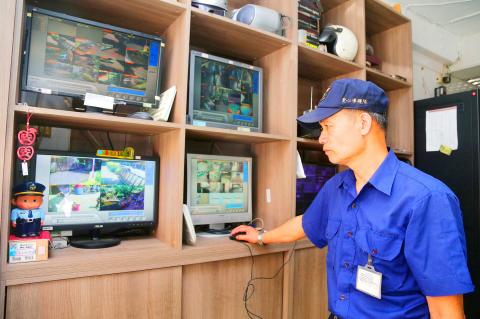Taipei plans to revise its system of keeping tabs on dangerous people, Taipei Mayor Ko Wen-je (柯文哲) said yesterday after the slaying of an eight-year-old student at an elementary school in the capital’s Beitou District (北投) on Friday.
Ko said the case raised questions about whether the city’s system should be expanded, given that it had not picked up murder suspect Kung Chung-an (龔重安) before the attack.
A review would be conducted once more was known about Kung’s social network and mental state, Ko added.

Photo: CNA
Problems revealed by the case focused more on prevention rather than the city’s response, Ko said, adding that city officers deserved a grade of 99 percent for their efficiency in handling the case.
In addition to reviewing how potentially dangerous residents are monitored, Ko said that the city would also consider revising the “open campus” policy that provides public access to school grounds.
School fences might be heightened as well, he added.
Kung was reportedly able to gain access to Beitou’s Wenhua Elementary School by hopping over a low barrier wall.
A rigorous registration system for entering campuses would be a better policy than completely blocking the entrance of strangers, Ko said, adding that a cost-benefit analysis would have to be conducted before the government would consider installing alarms in school restrooms, where Friday’s incident occurred.
He said the city’s first priority is to rebuild campus security to ensure that students feel safe attending classes.
After an emergency city meeting on Friday night, Taipei Police Commissioner Chiu Feng-kuang (邱豐光) promised to bolster safety, including conducting internal campus patrols on request.
Department of Education Commissioner Tang Chih-min (湯志民) said his department would review school security camera systems and entrance policies, as well as bolster internal patrols.
The city would also consider reintroducing officers to direct traffic near schools at the beginning and end of school days, Taipei Police Department Deputy Commissioner Chou Shou-sung (周壽松) said.

Alain Robert, known as the "French Spider-Man," praised Alex Honnold as exceptionally well-prepared after the US climber completed a free solo ascent of Taipei 101 yesterday. Robert said Honnold's ascent of the 508m-tall skyscraper in just more than one-and-a-half hours without using safety ropes or equipment was a remarkable achievement. "This is my life," he said in an interview conducted in French, adding that he liked the feeling of being "on the edge of danger." The 63-year-old Frenchman climbed Taipei 101 using ropes in December 2004, taking about four hours to reach the top. On a one-to-10 scale of difficulty, Robert said Taipei 101

Nipah virus infection is to be officially listed as a category 5 notifiable infectious disease in Taiwan in March, while clinical treatment guidelines are being formulated, the Centers for Disease Control (CDC) said yesterday. With Nipah infections being reported in other countries and considering its relatively high fatality rate, the centers on Jan. 16 announced that it would be listed as a notifiable infectious disease to bolster the nation’s systematic early warning system and increase public awareness, the CDC said. Bangladesh reported four fatal cases last year in separate districts, with three linked to raw date palm sap consumption, CDC Epidemic Intelligence

US climber Alex Honnold left Taiwan this morning a day after completing a free-solo ascent of Taipei 101, a feat that drew cheers from onlookers and gained widespread international attention. Honnold yesterday scaled the 101-story skyscraper without a rope or safety harness. The climb — the highest urban free-solo ascent ever attempted — took just more than 90 minutes and was streamed live on Netflix. It was covered by major international news outlets including CNN, the New York Times, the Guardian and the Wall Street Journal. As Honnold prepared to leave Taiwan today, he attracted a crowd when he and his wife, Sanni,

Taiwanese and US defense groups are collaborating to introduce deployable, semi-autonomous manufacturing systems for drones and components in a boost to the nation’s supply chain resilience. Taiwan’s G-Tech Optroelectronics Corp subsidiary GTOC and the US’ Aerkomm Inc on Friday announced an agreement with fellow US-based Firestorm Lab to adopt the latter’s xCell, a technology featuring 3D printers fitted in 6.1m container units. The systems enable aerial platforms and parts to be produced in high volumes from dispersed nodes capable of rapid redeployment, to minimize the risk of enemy strikes and to meet field requirements, they said. Firestorm chief technology officer Ian Muceus said